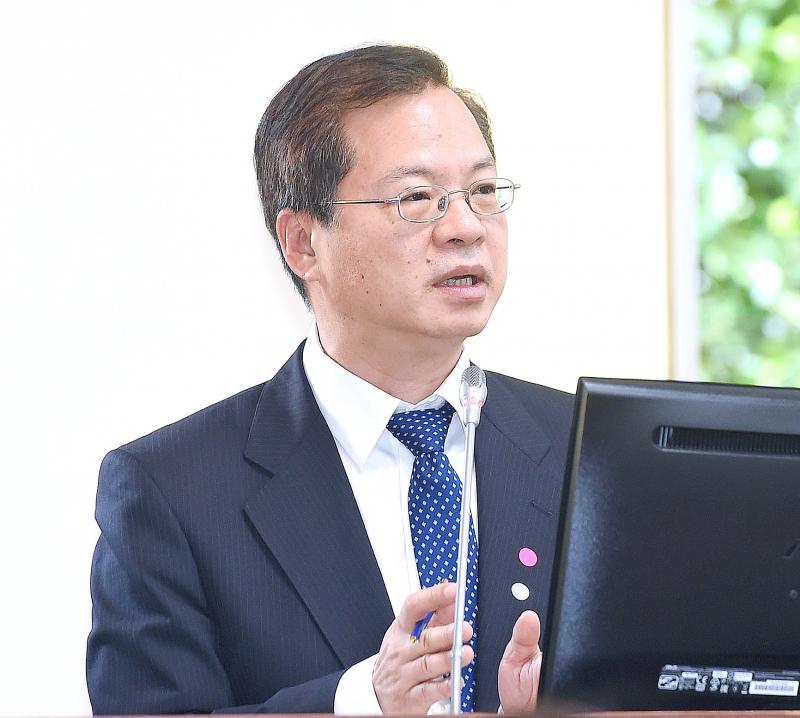The National Development Council (NDC) is considering creating a business climate index on Taiwan’s property market, allowing policymakers to better monitor market movements and intervene if necessary, NDC Minister Kung Ming-hsin (龔明鑫) said yesterday.
Kung made the remarks at a meeting of the legislature’s Economic Committee where lawmakers from across party lines voiced concerns about housing price hikes driven by capital repatriation.
Kung said that the council is assessing the possibility of creating an index designed to provide more accountable and transparent information than data provided by private-sector market analysts, and could help improve policymaking.

Photo: Liao Chen-huei, Taipei Times
The council would compile a report on the matter within a week, Kung said, but declined comment on whether the local property market is overheated and requires government action, due to unclear data.
The housing price to annual income ratio in Taiwan has dropped from 9.46 to about 8, suggesting that the market in most areas is stable, Kung said.
Housing prices in Taipei still lag behind the peaks in 2014, but are approaching new highs in Taichung, he said, adding that housing prices are also relatively high in Tainan and Kaohsiung.
The upward trend has drawn attention from the central bank, the Ministry of Finance and the Ministry of the Interior, and led to discussions among the agencies, Kung said, adding that the council is moderating the conversation.
The finance ministry has said it would not extend favorable tax conditions that are due to expire in August next year to attract capital return.
Capital repatriation is believed to have fostered this year’s property boom, while trading elsewhere in the world is taking a hit amid the COVID-19 pandemic, analysts have said.
Kung said that it has not yet been decided whether the real estate climate gauge should take the form of an index, an indicator or another form.
The government has to be careful on the issue because tightening measures might hamper the economy, Kung said.

With an approval rating of just two percent, Peruvian President Dina Boluarte might be the world’s most unpopular leader, according to pollsters. Protests greeted her rise to power 29 months ago, and have marked her entire term — joined by assorted scandals, investigations, controversies and a surge in gang violence. The 63-year-old is the target of a dozen probes, including for her alleged failure to declare gifts of luxury jewels and watches, a scandal inevitably dubbed “Rolexgate.” She is also under the microscope for a two-week undeclared absence for nose surgery — which she insists was medical, not cosmetic — and is

CAUTIOUS RECOVERY: While the manufacturing sector returned to growth amid the US-China trade truce, firms remain wary as uncertainty clouds the outlook, the CIER said The local manufacturing sector returned to expansion last month, as the official purchasing managers’ index (PMI) rose 2.1 points to 51.0, driven by a temporary easing in US-China trade tensions, the Chung-Hua Institution for Economic Research (CIER, 中華經濟研究院) said yesterday. The PMI gauges the health of the manufacturing industry, with readings above 50 indicating expansion and those below 50 signaling contraction. “Firms are not as pessimistic as they were in April, but they remain far from optimistic,” CIER president Lien Hsien-ming (連賢明) said at a news conference. The full impact of US tariff decisions is unlikely to become clear until later this month

GROWING CONCERN: Some senior Trump administration officials opposed the UAE expansion over fears that another TSMC project could jeopardize its US investment Taiwan Semiconductor Manufacturing Co (TSMC, 台積電) is evaluating building an advanced production facility in the United Arab Emirates (UAE) and has discussed the possibility with officials in US President Donald Trump’s administration, people familiar with the matter said, in a potentially major bet on the Middle East that would only come to fruition with Washington’s approval. The company has had multiple meetings in the past few months with US Special Envoy to the Middle East Steve Witkoff and officials from MGX, an influential investment vehicle overseen by the UAE president’s brother, the people said. The conversations are a continuation of talks that

CHIP DUTIES: TSMC said it voiced its concerns to Washington about tariffs, telling the US commerce department that it wants ‘fair treatment’ to protect its competitiveness Taiwan Semiconductor Manufacturing Co (TSMC, 台積電) yesterday reiterated robust business prospects for this year as strong artificial intelligence (AI) chip demand from Nvidia Corp and other customers would absorb the impacts of US tariffs. “The impact of tariffs would be indirect, as the custom tax is the importers’ responsibility, not the exporters,” TSMC chairman and chief executive officer C.C. Wei (魏哲家) said at the chipmaker’s annual shareholders’ meeting in Hsinchu City. TSMC’s business could be affected if people become reluctant to buy electronics due to inflated prices, Wei said. In addition, the chipmaker has voiced its concern to the US Department of Commerce